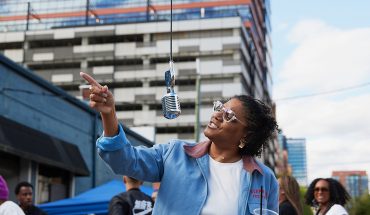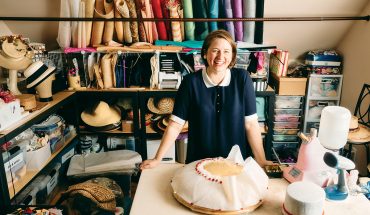by Todd Cohen
When she was a first-grader at Mary P. Douglas Elementary School in Raleigh, Kari Howe Stoltz volunteered to help raise money for a bike-a-thon to support a girl in her neighborhood who had cystic fibrosis. She’s been volunteering and raising money for charitable causes ever since.
As Triangle market president and senior client manager for Bank of America Merrill Lynch Global Commercial Banking, Stoltz oversees services from credit to international banking for companies ranging from hog farms to high-tech firms with annual revenue from $50 million to $5 billion. She also is senior leader for the bank’s civic activities, serving as the face of the bank in seven Triangle counties, and leading a funding team that evaluates and makes recommendations on grants proposals from local charities to the Bank of America Charitable Foundation.
She also serves on the boards of directors for charities ranging from YMCA of the Triangle to the WakeMed Foundation, and this year is chairing the annual fundraising campaign for United Way of the Greater Triangle.
“It’s inspiring and energizing to see how people work in this community to help other people, and their drive and determination,” she says of her board service. “It makes my life more fulfilling to be part of that and to support people’s efforts.”
Stoltz, 44, was born at the old Rex Hospital on Wade Avenue in Raleigh and graduated from Sanderson High School in Raleigh and UNC-Chapel Hill. She joined Bank of America in 1991 as a management trainee, and in May 2009 was named market president for the Triangle.
She and her husband, Jerry Stoltz, a builder and real estate developer, live in Raleigh with their two daughters, Haley, a third grader at St. David’s School, and Ellie, a first grader at St. David’s.
From my parents, I learned their work ethic. Mom (the late Patricia Chastain Howe) was a history professor at the University of St. Thomas in St. Paul, Minn. She commuted from Raleigh, and taught at N.C. State while she was getting her Ph.D. at UNC-Chapel Hill. Dad (the late Arthur King Howe Jr.) was in computer science before computer science was cool. He managed computer centers for Martin Marietta, then Parker Hannifin, then finished his career in the division of labor statistics at the Employment Security Commission. He worked in same building I was born in. I got my analytical side from him and my liberal arts side from her…it’s a great way to connect with people, regardless of what business you’re in.
I am motivated to volunteer because it’s the best way to support our community and give back to my hometown. Throughout my career, I’ve always volunteered in whatever town I’ve been in. (She also has worked in Charlotte, Dallas, Cherryville, Greensboro, Durham and Chapel Hill, all in North Carolina.) And I’ve gotten a lot back from the people I’ve met. I learned by getting more involved with different organizations and different people. You really open yourself up to a whole new world.
Education is important always. Education levels the playing field, not only from Pre-K and getting them prepared in school to be successful and pursue different careers, but also for people who are older, maybe going through a career change. With our economy, a lot of people have had to regroup and retrain. And also expanding people’s horizons, like the Symphony or Ballet or North Carolina Museum of Art. Those are all organizations that contribute to the depth of our quality of life. And affordable housing and giving people a safe place to live, and that safety net of support and the leg up that all of those (health and human) services provide that help take care of the basic needs – that makes our community strong.
In high school, I volunteered for the junior women’s club, the Juniorettes. We would organize fundraisers and volunteer efforts in the community. When I was in college, I volunteered for different organizations, like the Campus Y, and was involved in freshman camp. I also was president of the Panhellenic Council. We would raise money through the sorority system, and donate it. And I’m on the board of Triangle YMCA. I grew up going to the Y and was a counselor at Camp Seafarer (a girls camp in Arapahoe operated by YMCA of the Triangle). But it’s taken it to a higher level serving on the board.
It’s exciting to see Raleigh’s evolution from a small southern capital to a sophisticated cosmopolitan region. My parents used to tease that the two restaurant choices were (Clyde) Cooper’s Barbecue and the Angus Barn. Now we’re known for our restaurants, everything from Vietnamese to Thai to Laotian, and good old pit barbecue. And Angus Barn is a gem on the map.
What I like about Raleigh is the people. They’re just warm. We’ve got a great eclectic group of a lot of different people. I’ve got friends who grew up here and who moved here from Belgium. And it’s got the sophistication of a high-tech, well educated, culturally sophisticated town, and the friendliness of a small town. I don’t feel like Raleigh’s trying to be anything. We are growing and thriving and at the top of all the lists because we are who we are, and it’s comfortable.
My mom is my hero. Seeing her get her Ph.D. at a time when women were discouraged from pursuing that level of degree, and her sense of adventure and willingness to learn and her openness to new things. She got her master’s at the University of Hawaii after she graduated from William and Mary. She and my dad traveled to the Soviet Union. She was a diver in high school and almost qualified for the Olympics. She always seemed to have an open mind. Her curiosity and love for learning is still an inspiration to me. It’s always easy to think you know what you like and don’t like. But it’s always important to try new things, and get out of your comfort zone.
In Raleigh, I admire Judy Bright (a consultant who was director of Triangle YMCA’s Camp Seafarer, and later executive vice president at the Y). She inspires me with her energy and enthusiasm and her pure passion for giving to kids. She’s also an incredible leader. At camp, she taught us how to handle a lot of different situations, with grace under pressure. There were a lot of kids and you had to make sure they were all safe, and inspire the counselors to have passion about the kids and their safety. She was very motivational and knew how to connect with a lot of different people on a lot of different levels. In a successful organization, you’ve got to be able to relate to a lot of different people and what motivates them. I felt a responsibility to her. I didn’t want to let her down.
If I could fix a social problem, it would be hunger. It would have to be a huge collaborative effort with organizations like the Food Bank (of Central and Eastern North Carolina) and Urban Ministries (of Wake County) that deliver food and grow food, and include the school systems.
An effective giver is someone who gives from the heart, and gives their time as well as their money. There’s a comprehensive approach.
Right now I’m reading The Girls of Atomic City. It’s about the Oak Ridge (National Laboratory) during World War II. Women played myriad roles, from secretaries to teachers and scientists, in developing the atomic bomb.
My philosophy of life is to enjoy the present with a sense of humor.




